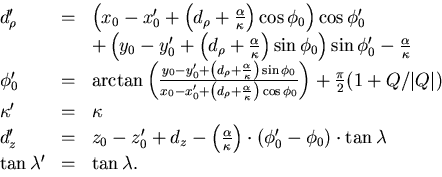


Next: Track Extrapolation
Up: General Discussions without Momentum
Previous: Generalities of Track Fitting
As it will become clear, it is very useful to establish procedure to
change pivot positions, since an appropriately chosen pivotal points
simplifies calculations necessary, for instance, in energy loss or
multiple scattering corrections significantly.
The pivot change
induces the following change in the helix parameter vector:
where the new parameters are given in terms of the old ones as
follows:
|  |
(9) |
The above relations can be readily obtained by requiring the
primed parameter vector represents the same helix as the unprimed
one.
The error matrix should also be transformed accordingly:
|  |
(10) |
where the calculation of the transformation (Jacobian) matrix
is straightforward from Eq.2.3.14 but it is rather tedious and
therefore not shown here.
Keisuke Fujii
12/4/1998
